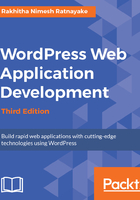
WordPress as a CMS
Way back in 2003, WordPress released its first version as a simple blogging platform and it continued to improve until it became the most popular blogging tool. Later, it continued to improve as a CMS (Content Management System) and now has a reputation for being the most popular CMS for over five years. These days, everyone sees WordPress as a CMS rather than just a blogging tool.
Now the question is, where will it go next?
Recent versions of WordPress have included popular web development libraries such as Backbone.js and Underscore.js and developers are building different types of applications with WordPress. Also, the most recent introduction of the REST API is a major indication that WordPress is moving towards the direction of building web applications. The combination of the REST API and modern JavaScript frameworks will enable developers to build complex web applications with WordPress.
Before we consider the application development aspects of WordPress, it's ideal to figure out the reasons for it being such a popular CMS. The following are some of the reasons behind the success of WordPress as a CMS:
- The plugin-based architecture for adding independent features and the existence of over 40,000 open source plugins
- The ability to create unlimited free websites at www.wordpress.com and use the basic WordPress features
- A super simple and easy-to-access administration interface
- A fast learning curve and comprehensive documentation for beginners
- A rapid development process involving themes and plugins
- An active development community with awesome support
- The flexibility in building websites with its themes, plugins, widgets, and hooks
- The availability of large premium theme and plugin marketplaces for developers to sell advanced plugin/themes and users to build advanced sites with those premium plugins/themes without needing a developer
These reasons prove why WordPress is the top CMS for website development. However, experienced developers who work with full stack web applications don't believe that WordPress has a future in web application development. While it's up for debate, we'll see what WordPress has to offer for web development.
Once you complete reading this book, you will be able to decide whether WordPress has a future in web applications. I have been working with full stack frameworks for several years, and I certainly believe in the future of WordPress for web development.